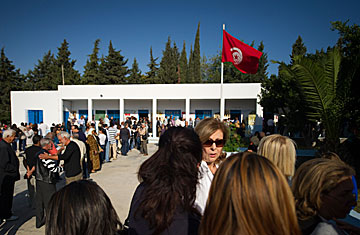
Tunisians line up outside a polling station in La Marsa to cast their votes in the country's first ever free elections on Oct. 23, 2011
If voter turnout is the measure, the first elections of the Arab Spring closed as a smashing success on Sunday. Tunisians of all ages and social classes packed into polling stations across the country to cast their votes in the first free elections that the North African country has seen since it gained its independence in 1956. Tunisia's electoral commission said close to 70% of registered voters cast their ballots.
The vote will usher in a 217-member constitutional assembly whose primary task will be to draft a new constitution over the next year, ahead of parliamentary and presidential elections.
More significantly, it's the first official step in Tunisia's transition to democracy after the January uprising that ousted President Zine el Abidine Ben Ali, the country's dictator for 23 years. And in some neighborhoods of the capital, Tunis, men and women stood in line for hours during the initial rush of the early morning, some giddy with excitement. "I'm very happy to be able to vote. It's a historical moment," said Lamia Tliba, a marketing professor who had been waiting for an hour outside a polling station in the upper-middle-class neighborhood of Bardo. "I can stay here all day." By midafternoon in the poor neighborhood of Hay al-Khudra, Mohamed Zoghlamy, 70, had been waiting even longer. But he too only smiled: "The people who died [in the revolution] didn't complain. Why should we?"
In an effort to rally as many people as possible to the polls, the transitional authorities had set up polling stations for even the unregistered voters to participate on Sunday. Those too were packed. And while some complained of voting irregularities (one man said he spotted his dead father's and brother's names listed on a voter registry), the monitors and election authorities TIME spoke to described a process that was peaceful and orderly. "It was so organized, so unexpected, and highly civilized," remarked Reda Sassi, a monitor from the High Committee to Protect the Revolution at a polling station in Ariana, a middle-class suburb north of Tunis.
The election is a crucial test for the regional phenomenon that started in Tunisia and has become known as the Arab Spring. What began with the self-immolation of a young Tunisian fruit seller last December quickly snowballed into a wave of popular uprisings that has swept thousands of pro-democracy protesters into the streets across North Africa and the Middle East in the months since. In Tunisia, Egypt and Libya, the Arab Spring toppled dictators. In Yemen and Syria, it has seen the launch of civil wars; leaders in Jordan and Morocco have hurried to make concessions in light of the power of popular will.
Still, the most important thing about the Arab Spring is how it all ends. And Tunisia's transition to democracy — successful or not — will be a bellwether for all the others, which have so far traveled bumpier rides.
As political analysts predicted — and liberals across the region feared — many of Sunday's voters said they voted for the popular Islamist party, Ennahda. Some said they chose the party almost automatically — "they're everywhere" was a common refrain; "they're known" was another reason for voting for a party that was heavily repressed by Ben Ali but challenged him all along. Still, many others said they found the party's religious message inspiring. "Islamic law," exclaimed Tawfiq Bin Mohamed, 62, listing the things that he hoped an Ennahda-led government would ban: gambling, drinking, adultery, homosexuality and bribery. "I have no problem with women voting," he added. "They are free. What I want is Muslim women who fear God and do not do things that oppose Islam. There are many women in Tunisia who don't know the word of God because they have European ideas."
Even so, other parties appeared to claim large numbers of voters too. And in some predominantly liberal areas, many Tunisians said they were voting "against Ennahda," choosing popular leftist parties like Ettakatol and the coalition called the Democratic Modernist Pole, or independent lists instead. At one Tunis polling station, Ennahda's leader Rached Ghannouchi faced heckling by voters who called him a "terrorist" when he went to cast his vote, according to Reuters news service.
But most voters said they were happy and proud of what transpired. "This is freedom," said Hassan Benzarte, leaving a polling station in Ariana, where he held up a blue-ink-stained finger, proof that he had cast a ballot. "I feel responsible," smiled Fatima Zaddem, 19. Khalil el-Almi, a medical student, couldn't believe that the protests that had gotten him jailed and beaten in January had led to this. And for the elderly Tunisians, who turned out in force — many helped along by walkers, canes or the arms of grandchildren — they said it was the sweetest end to decades of silent repression. "Of course I'm excited," said a frail but beaming Zeinab Shenawi, 71. "It's my first time," she added. "It's like I'm going to a marriage ceremony!"
